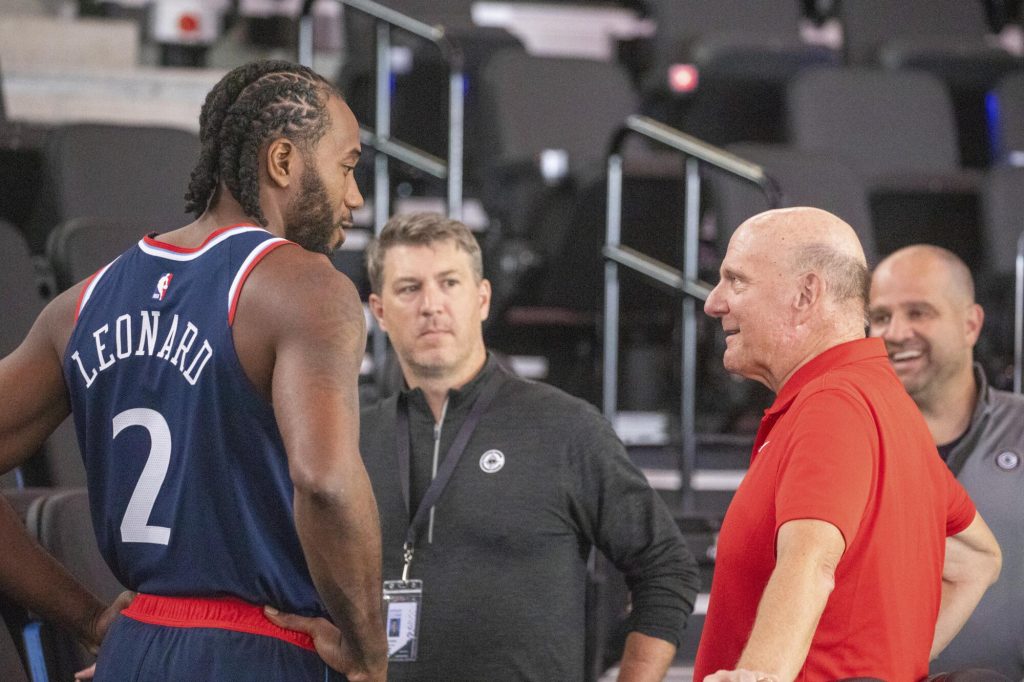Clippers owner Steve Ballmer now faces lawsuit from investors alleging he used failed startup to circumvent salary cap in compensating Kawhi Leonard
A corporate fraud case that has already resulted in a guilty plea is now threatening to become one of the most consequential scandals in NBA history, with Los Angeles Clippers owner Steve Ballmer facing a fresh lawsuit alleging he exploited a fraudulent fintech company to illegally compensate superstar Kawhi Leonard.
The Fraud Foundation
Joseph Sanberg, co-founder of Aspiration—a sustainable banking startup that marketed itself as an eco-friendly alternative to traditional financial institutions—pleaded guilty in October to two counts of wire fraud in a scheme that defrauded investors and lenders of more than $248 million. Federal prosecutors said that beginning around 2020, Sanberg used his position to deceive investors through falsified financial statements, fabricated revenue via sham contracts, and misrepresented the company’s cash reserves.
The company filed for bankruptcy on March 30, 2025, after spinning off its consumer financial services and rebranding its carbon business as Catona Climate. Each fraud count carries a maximum sentence of 20 years in prison.
The NBA Connection Emerges
The story took a dramatic turn in early September when journalist Pablo Torre revealed that Leonard had signed a four-year, $28 million endorsement deal with Aspiration in April 2022—nine months after re-signing with the Clippers. Torre’s investigation found no evidence Leonard ever publicly endorsed the company or performed any promotional work, leading to allegations of a “no-show job.”
Additional reporting later suggested the total compensation may have reached $48 million when including a secret side deal, though this remains disputed. An unnamed former Aspiration employee told Torre’s podcast that the payment “was to circumvent the salary cap.”
The timing raised eyebrows: Ballmer made a $50 million investment in Aspiration, and the company and team announced a $300 million partnership in September 2021, about a month after Leonard signed a four-year, $176 million extension with the Clippers.
Fresh Legal Challenge
In a significant development, eleven former Aspiration investors filed a 133-page lawsuit originally on July 9, 2025, but added Ballmer as a defendant on Monday, November 4—just yesterday—in light of Torre’s reporting. The amended complaint alleges far more than passive victimhood on Ballmer’s part.
According to the lawsuit, Ballmer allegedly used Aspiration to covertly funnel money to Leonard as supplemental compensation beyond his official NBA salary, which is subject to strict league-imposed limits. The plaintiffs claim Ballmer was “complicit in and aided and abetted Sanberg’s fraud for his own self-serving purpose,” arguing it “served Ballmer’s interest in getting extra money to Leonard so he could circumvent the salary cap, beat out the competition and re-sign his team’s superstar player.”
The complaint alleges that Ballmer transferred additional funds to keep Aspiration afloat and buy Sanberg’s “support, cooperation and silence about the secret deal with Leonard,” with the full extent of these transfers to be determined in discovery.
Ballmer’s Defense
Ballmer has vigorously and repeatedly denied any wrongdoing. In statements, the Clippers organization said “Neither the Clippers nor Steve Ballmer circumvented the salary cap,” calling the notion that Ballmer invested in Aspiration to funnel money to Leonard “absurd.” Ballmer told ESPN he was “embarrassed” he didn’t detect the fraud, saying “These were guys who committed fraud. Look, they conned me. They conned me.”
The team stated that Ballmer invested because “Aspiration’s co-founders presented themselves as committed to doing right by their customers while protecting the environment,” and claimed neither Ballmer nor the organization “had knowledge of any improper activity by Aspiration or its co-founder until after the government initiated its investigation.”
Leonard himself has also denied wrongdoing. At the Clippers’ media day in late September, Leonard said the allegations were inaccurate and noted the company’s bankruptcy was old news to those involved.
The Investigation
The NBA launched a formal investigation and hired the prestigious New York law firm Wachtell, Lipton, Rosen & Katz to conduct the probe, with no set deadline for conclusions. NBA Commissioner Adam Silver said last month there is no timetable for the investigation to reach a conclusion, and confirmed the All-Star Game scheduled for February 15 at the Intuit Dome in Los Angeles will proceed as planned.
The league’s inquiry centers on Article XIII of the NBA’s Collective Bargaining Agreement, which prohibits teams from providing compensation to players outside their contracts. If salary cap rules are found to have been broken, penalties could include fines up to $7.5 million, voiding of contracts, and forfeiture of future draft picks.
Broader Implications
This case raises profound questions about oversight in both the venture capital world and professional sports. How did sophisticated investors—including a tech titan like Ballmer—fail to detect a fraud of this magnitude for years?
For the NBA, the allegations strike at the heart of the salary cap system, a cornerstone of competitive balance since 1984. If wealthy owners can disguise compensation through third-party investments, the entire framework comes under threat.
The civil lawsuit, now naming Ballmer directly, will proceed through California courts while the NBA’s investigation continues separately. As discovery unfolds and witnesses testify, both legal proceedings may shed light on whether this was a case of an owner defrauded by a con artist—or something far more calculated.
What began as the collapse of a sustainable banking startup has evolved into a test of the NBA’s ability to police its most powerful figures and protect the integrity of its competition.

